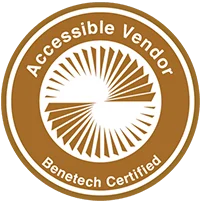KnowledgeWorks Global Ltd. is proud to be a Benetech Global Certified Accessible conversion vendor
Content accessibility is vital in today’s diverse and inclusive world. It is about making sure digital content is designed and created to be accessible to all users including those with disabilities.
Learn more.


KnowledgeWorks Global Ltd. is a champion of digital equality.
When it comes to content delivery, accessibility has become an important and desirable goal. The technologies and guidelines that improve access to materials for people with visual or hearing impairments, limited mobility, perceptual and cognitive differences, or who face other barriers to reading printed materials is also tremendously useful to other users. For example, the closed captions in a video, the read aloud feature in eBooks, the image descriptions which helps the user to access the same information in an alternate way and is understandable. There are multiple benefits to creating accessible content:
- Equal access to people with disabilities
- Comply with legal requirements and laws
- Broaden reach to audience
- Enhanced user experience
- Increased brand loyalty and customer satisfaction
KGL assists its clients with accessibility consulting, auditing and remediation as per ADA / 508 / WCAG standards to comply with national / international laws for content accessibility.
KGL has established workflow, a team of highly experienced accessibility experts and adopts industry best practices and tools. We design and develop accessible E-learning courses, learning materials, games, website content, PDF, Word, presentations, multimedia, eBooks, etc. for content across industry from scholarly and education publishers to managed healthcare providers.
Discover our range of accessibility resources and learn how partnering with us can keep you at the forefront with enriched content accessibility and enhanced product and user experience.
Experience With Many Formats, Standards, and Methodologies
-
EPUB3: The most widely supported XML-based eBook format, platform independent, originally developed by International Digital Publishing Forum (IDPF) and now maintained by the World Wide Web Consortium (W3C)
-
HTML5: The current version of the markup language that is the cornerstone of the Internet, supporting cleaner markup of text, consistency, and support of rich media elements
-
XML-first Workflow: This practice helps content creators simultaneously deliver print, online, and EPUB files
-
Layout and Design: A well-thought-out approach to content layout, including a logical reading order, goes a long way not only for readers with disabilities, but for all users
-
Alt Text: Meaningful descriptions for images and important non-text items, to aid content discovery and voice search
-
Closed Captioning: A must for all video content, for both disabled readers and other users who forego audio
-
Accessibility Metadata: Provides information about the accessibility of a digital publication. Buyers can discover publications that meet their needs and preferences. Metadata is machine readable and helps in SEO and discovery
-
MathML: A mathematical markup language for describing mathematical notations and capturing structure in documents
-
Section 508: The amendment to the US Rehabilitation Act to require Federal agencies to make content and technology accessible to people with disabilities
-
WCAG: The Web Content Accessibility Guidelines published by the W3C that specify how to make content accessible, primarily for people with disabilities
-
DAISY: The Digital Accessible Information System is a technical standard for audiobooks, periodicals, and digital text
-
NIMAS: The National Instructional Materials Accessibility Standard is a provision of the Individuals with Disabilities Education Act stipulating how publishers provide accessible curricular materials to students in grades K-12
Webinars
Latest Insights
This April, the Americans with Disabilities Act Title II regulations finally come into play. Here we look at what this means for publishers and the steps they might be taking to comply.
AI is shifting from tools to operating layers. KGL's Hong Zhou highlights what eight major trend reports reveal for the future of scholarly publishing and education.
At the start of each year KGL gathers its brightest minds and aims to second guess what will be the big themes in publishing of the year ahead.




